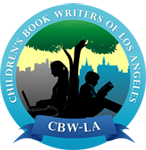Workshop Description:
Authors Leigh Bardugo (Shadow and Bone) and Jennifer Bosworth (Struck) discussed common mistakes made by first-time authors and the things they wish they'd done differently on the road to publication.
The topics they touched on included: how to build a better first draft, balancing critique and community with the integrity of personal voice, researching and approaching agents, what writers need to expect when they''re on submission, and how to evaluate their publishing deals.
They also shed light on what happens after the sale and discussed what writers may want to know as theywork with editors and publicists to polish and promote their books.
Speakers Bio (from their websites):
YA Author Leigh Bardugo (Shadow & Bone)
Leigh Bardugo was born in Jerusalem, grew up in Los Angeles, and graduated from Yale University. These days, she live sin Hollywood, where she indulges her fondness for glamour, ghouls, and costuming in her other life as make up artist L.B. Benson. Occasionally, she can be heard singing with her band, Captain Automatic.
Her debut novel, Shadow & Bone (Holt Children’s/Macmillan), is a New York Times Bestseller and the first book in the Grisha Trilogy. Book 2, Siege and Storm, will be published in 2013. She is represented by Joanna Stampfel-Volpe of New Leaf.
www.leighbardugo.com
YA Author Jennifer Bosworth (STRUCK) 
Jennifer Bosworth was born in Price, Utah, a small, coal-mining town in the desert. As a kid, her favorite thing to do was roam alone through the barren hills and tell herself stories. As an adult, she continues to do the same thing, only now she’s roaming the streets of Los Angeles, her favorite city in the world.
Jennifer attended college at the University of Utah, where she later taught continuing education classes on writing horror, fantasy, and science fiction.
Struck (FSG/Macmillan) is Jennifer’s first published novel. She is represented by Jamie Weiss Chilton of the Andrea Brown Literary Agency.
Jennifer is the writer half of the writer/director team with her husband, Ryan Bosworth.
www.jenniferbosworth.com
Workshop Summary:
Last Saturday (August 18, 2012), CBW-LA had the wonderful pleasure of having YA Authors Jennifer Bosworth and Leigh Bardugo as speakers.
The Mysterious Galaxy Bookstore was packed with writers eager to learn more about writing and the publishing industry.

The speakers prepared a wonderful presentation, full of information that would help beginning writers get started on their writing careers. They even prepared a handout so members could easily follow the workshop.
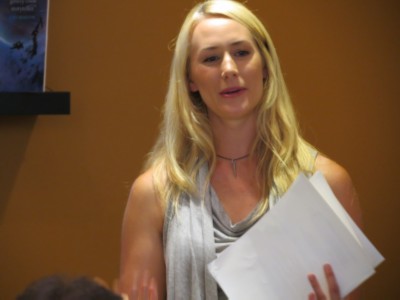
Speaker Jennifer Bosworth explaining the handouts
The authors were generous in the information they shared, and despite the presence of handouts, the workshop attendees found themselves furiously scribbling pages upon pages of notes.
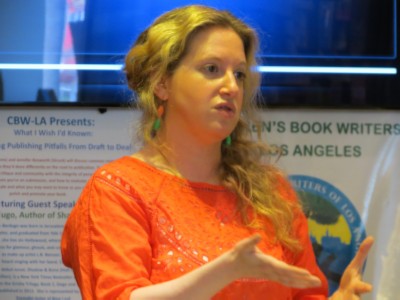
Speaker Leigh Bardugo giving tips on how to create an exciting middle in one's novel
Authors Jennifer and Leigh emphasized the importance of understanding your story idea, and considering the audience you wish to write for.
They also stated the importance of being able to sum up your story in one sentence. They discussed the value of loglines, and the difference between high concept loglines and and regular loglines.
Attendees volunteered their loglines. The speakers helped them figure out if their loglines contained high concept ideas, and even helped them improve and strengthen their one sentence summaries.
The speakers also explained the ingredients of a proper logline: character + conflict + hook. Not all stories need to be high concept, but they should always have some kind of hook.
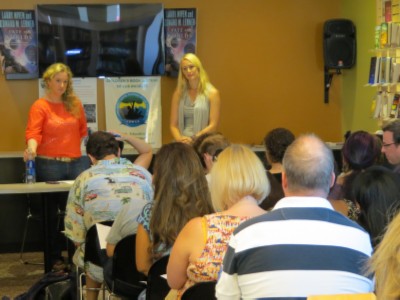
Leigh and Jennifer listening to an audience member's question
Leigh and Jennifer gave the following questions writers need to ask, when Crafting their logline:
1. Who is your main character?
2. What does your MC want?
3. Why does your MC want it?
4. What’s the catch? What stands in the MC's way?
5. What sets the MC's journey in motion?
6. What makes this story unique? What’s the hook?
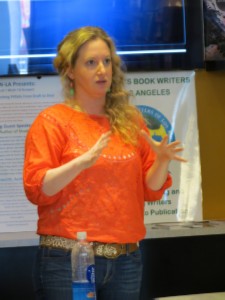
After helping the attendees with their loglines, the speakers discussed the two kinds of writing: Plotting and Pantsing, and the pros and cons between the two.
Jennifer and Leigh are polar opposites in their writing styles, and they were perfect examples of how different plotters are from pantsers.
Leigh is a plotter and admitted that she would not be able to sit down and write without some semblance of an outline. The wonderful benefit of being a plotter, is that the revisions are less painful because you already know the structure of your story. One of the cons of plotting, however, is that there is no perfect plan, and sometimes too much research can bog a writer down.
Jennifer is a pantser and loves the process of discovery and of surprising herself. One of the downsides she mentioned was that without an outline, it was easy for her to get lost in the story.
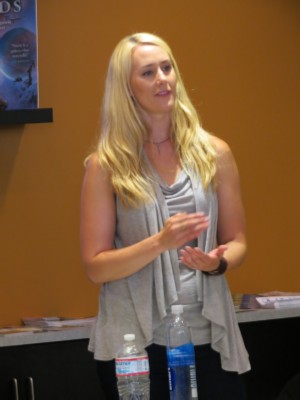
On Getting Feedback
Jennifer and Leigh warned writers about submitting a manuscript without getting feedback for it first:
*An agent or editor should never be the first person to see your manuscript
They explained the different ways of getting feedback, such as attending a critique group or going to workshops and conferences that offer manuscript critique.
They gave the following tips for making the most of your feedback:
1. Listen. Don’t argue. Give the critique a chance to settle in before revising
2. Beware critique overload – there is such a thing as having too many betas
3. Red flags: betas who don’t like your genre; nitpickers; the beta ego
4. Stack the deck: Tell betas what you need, keep readers in reserve.

Audience members eagerly listened as the two speakers talked about the process of finding the right agent.
The speakers had very different experiences in getting their agents.
Leigh got her agent through the usual process of querying, and she gave the attendees some great tips for writing their query letters:
• Keep it short: One page, roughly 3 short paragraphs
• Put the hook up front: What makes your story different?
• Do your research and personalize your queries (Why this agent?)
• Query in small batches so that you can adapt to feedback
Jennifer, on the other hand, got her agent by pitching in person. She and Leigh even did a demonstration on how a pitchfest usually works. Jennifer gave the following helpful tips for pitching in person:
•Be excited about your book!
•Speak for 1 minute and then let the agent/editor ask questions
•Use time wisely. If agent/editor is not interested, use remaining time to ask for his/her opinion or advice
The speakers also discussed what writers should do when they do get The Call. They cautioned writers against saying "yes" right away, likening the process of choosing an agent to marriage.
They gave a list of some helpful questions to ask an agent before deciding on who to pick:
• How many authors do you represent?
• What kind of revisions do you have in mind for the book?
• How wide would you go with the book?
• How and how often do you like to correspond with your clients?
• How involved are you with social media and marketing of your clients?
• Do you have clients I could speak to?
• If the book doesn't sell right away, what would be your approach?
In the final part of the workshop, the speakers discussed what happens once an author signs a contract with a publisher.
There are a lot of things to consider when signing a publishing contract: foreign rights, , royalties, bonuses, marketing plans. An agent can help an author handle all of these things.
Leigh also weighed in on the subject of writing a series. If you're planning to write a series, don't write the second book until the first one sells. If the publisher offers to buy your book as a series, be ready with a synopsis for the succeeding books.
The speakers also explained that the submissions process takes anywhere from 1-2 years. Agents have to find the right editor, and these editors also have to find a way to sell the author's book to the whole publishing company. It's important that the author stay busy during this submissions phase. While they're waiting for the editor's notes, they should be writing the next book, or working on a promotion strategy for their books.
Jennifer and Leigh ended their workshop by inviting audience members to take a piece of paper and write down their writing goals. The attendees wrote down their goals and slipped the paper into the SASE's they had brought.
The authors promised to mail these letters off in a few months, as a reminder to the attendees about the writing promises they had made to themselves.
Leigh and Jennifer were gracious, generous, knowledgeable (and funny!) speakers and we were very, very lucky to have them indeed!
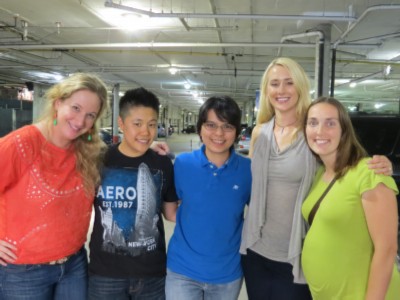
CBW-LA Officers with Authors/Speakers Leigh Bardugo & Jennifer Bosworth, photo by Maiko
